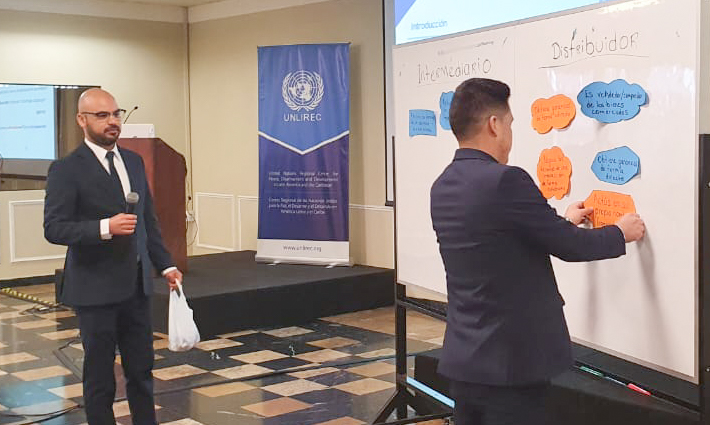From 12 to 16 September 2022, United Nations Regional Centre for Peace, Disarmament and Development in Latin America and the Caribbean (UNLIREC) in collaboration with the Peruvian Ministry of Foreign Affairs of Peru, held a Course on Combating Trafficking in Arms and Ammunition (CTAM) for over 43 officers from Peruvian institutions responsible for implementing controls on international transfers, and other national agencies involved in combating illicit trafficking.
Representatives from the Ministry of Foreign Affairs, Ministry of National Defense, Customs, National Police, National Intelligence Directorate, National Superintendence for the Control of Private Security Services, Arms, Ammunition, and Explosives for Civilian Use (SUCAMEC), Military Industry of Peru (FAME) and Army, Navy, and Air Force of Peru participated and shared their experiences and challenges to address this phenomenon.
“We are convinced that this course will open up a space for reflection and discussion to improve capacities in the development and adoption of national measures, as well as the application of good practices that some countries in the region are developing to reinforce the controls of firearms and ammunition, with a view to providing greater security and stability to the population,” said Milagros Winkelried, legal specialist of the Directorate of Security and Defense of the Ministry of Foreign Affairs and coordinator of the National Commission against the manufacture and trafficking illicit firearms, ammunition, explosives and other related materials (CONATIAF).
Over the course of five days, presentations and discussions focused on legal and practical responses to arms and ammunition trafficking, including presentations on trafficking trends in Latin America and the Caribbean, different methods used for illicit manufacturing and trafficking in firearms, and the role national control systems and documentation for international transfers of firearms and ammunition play in combatting the problem. The course also touched upon measures which can prevent illicit brokering and mechanisms for international cooperation against illicit trafficking in firearms.
Presentations by the National Intelligence Directorate on national trends and challenges and a briefing by CONATIAF on key activities they are implementing to strengthen Peru´s capacities to prevent, reduce, and combat arms and ammunition trafficking, provided a national context and the backdrop for discussions among participants.
A highlight during the course was the live demonstration of a 3-D printer. This allowed participants to witness first-hand the risks associated with this new form of technology, which is increasingly used to illicitly manufacture firearms and which poses a series of new challenges to national responses to illicit firearms trafficking.
The CTAM course forms part of UNLIREC’s “Combatting Illicit Firearms and Ammunition trafficking in Latin America and the Caribbean” project and was funded by Germany.
For more information on UNLIREC and the support it provides to the 33 States of Latin America and the Caribbean in promoting and enhancing efforts towards global disarmament and international peace and security through regional disarmament efforts, visit www.unlirec.org.











